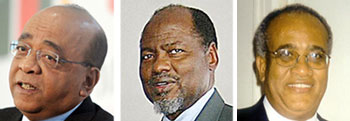African leaders call for peaceful elections in Sudan
By Amelia Lawrence | Last updated: Apr 9, 2010 - 11:20:18 AMWhat's your opinion on this article?
NAIROBI (IPS/GIN) - With less than a month to the historic multi-party poll in Africa's largest country, Sudan, eminent African leaders are calling for a peaceful and calm election process.

(L-R) Dr. Salim Ahmed Salim, Joachim Chissano, Dr. Mohamed Ibrahim
|
Observers from the Carter Center, a non-governmental organization founded by former U.S. president Jimmy Carter which aims to further democracy and human rights, have already raised concerns about the elections.
The center said in a statement that “with a series of delays and changes in polling procedures, a minor delay in polling for operational purposes may be required.”
Former African Union envoy for Darfur and former Organization of African Union head, Dr. Salim Ahmed Salim, said he hoped the elections “will give the people of Sudan the right to decide who they want to have in power.”
This is a view shared by former Mozambican President and African Union envoy for Madagascar, Joachim Chissano.
“The message to the Sudanese people is that peace comes first, permanent dialogue is an instrument to build peace and development in the country,” said Mr. Chissano during a sideline event at the Pan African Media Conference in Kenya.
Mr. Chissano, Mr. Salim and head of the Mo Ibrahim Foundation, Dr. Mohammed “Mo” Ibrahim, were speaking in Nairobi on the Sudanese election and the Comprehensive Peace Agreement.
“Whatever the difficulties, the dialogue for peace must continue,” said Mr. Chissano.
Mr. Ibrahim was hoping for much more: “I hope a miracle happens so that people can see beyond their noses and beyond their immediate interests.”
Almost 16 million Sudanese have registered for the April 11 election that will take place over three days. The elections were promised in the 2005 peace deal that ended more than two decades of north-south civil war.
Concerns about the processBut there are concerns about the process leading up to the poll. Carter Center officials have issued a report saying Sudan's April presidential and legislative elections remain “at risk on multiple fronts” and urged the country to lift harsh restrictions on rallies.
The center stated that it “strongly recommends that the NEC (National Elections Committee) and other Sudanese authorities take steps to ensure that the campaign period is both peaceful and fair to all candidates and to quickly address any violations that arise.” They said that failure to do so will erode confidence in the election process and put the elections and its success at risk.
Several political parties have called for a postponement of the elections. But it has been reported from the capital, Khartoum, that the country's NEC has downplayed any fears of postponing the elections. The NEC said a series of meetings involving all political parties will be organized to address any concerns before the elections.
‘Voting for a Southern president?'Sudanese born British mobile tycoon, Mr. Ibrahim suggested that North Sudan vote for a president from the South. This, he says, will convince the South to vote for unity in the 2011 referendum, when voters will decide whether to secede from the North.
“I always say one way to the miracle of solving the country's problems, is why don't we have a president from Southern Sudan? Why don't all the candidates say ok, let us have a president from the south? It does not matter whether (it is a) he or she as long as it is someone from the South who is fit to run the country.”
There are 12 candidates running for the presidential position. There are two main contenders in the South: Salva Kiir, from the Sudan People's Liberation Movement and Lam Akol, from the Sudan People's Liberation Movement-Democratic Change.
Mr. Ibrahim said that the north should give the south a chance to lead the entire country.
2011 and beyond?
Mr. Salim said the 2011 referendum for South Sudan remains a thorny and emotive issue. “My own view is that whether the South opts for secession, it's their right to do so, but the situation must be handled with care,” he said.
Mr. Salim says the north has to make unity attractive to South Sudan and admits that this has not been done. “My preference is to keep one country, a united Sudan,” Mr. Salim said.
He added that “Africa will prefer one Sudan.” But Africa will respect the will of the Southerners if they vote in favor of a split, Mr. Salim added.
INSIDE STORIES AND REVIEWS
-
-
About Harriett ... and the Negro Hollywood Road Show
By Rabiah Muhammad, Guest Columnist » Full Story -
Skepticism greets Jay-Z, NFL talk of inspiring change
By Bryan 18X Crawford and Richard B. Muhammad The Final Call Newspaper @TheFinalCall » Full Story -
The painful problem of Black girls and suicide
By Charlene Muhammad -National Correspondent- » Full Story -
Exploitation of Innocence - Report: Perceptions, policies hurting Black girls
By Charlene Muhammad -National Correspondent- » Full Story -
Big Ballin: Big ideas fuel a father’s Big Baller Brand and brash business sense
By Bryan Crawford -Contributing Writer- » Full Story






 Click Here Stay Connected!
Click Here Stay Connected!








